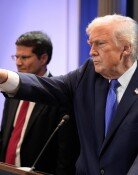[Editorial] Consistency in Economic Policy Matters
[Editorial] Consistency in Economic Policy Matters
Posted March. 27, 2003 22:18,
The Roh administration has come up with the blueprint for its economic policies for the next five years to come. The main ideas in the blueprint are summed up as follows: stability and reform. In the wake of shaking and fluctuations in the market, the administration has wisely sorted out tasks into two categories, or urgent and long-term tasks. The plan shows that the government will initiate deregulation drives to encourage corporate investment and launch public economic projects earlier. It is also laudable. Other plans also standing out, including introduction of 20-year mortgage system, allowance of manufacturing of diesel passenger cars, and alleviation of the restriction that prohibits establishment of foreign-invested companies in the Seoul metropolitan area. The administration also promulgated how it would reform the 4 major sectors of the economy such as public, labor, financial and corporate.
Previous administrations, however, always came up with rosy plans. Unfortunately, they had never put their words into practice. The economic crisis in 1997 was not triggered by lack of economic knowledge. The guys in power knew everything. Nonetheless, they failed to carry out their plan as promised, sometimes due to political reasons, or other times due to special interests. That was why this country was pushed almost into the point of insolvency.
Through the experiences, we have got to realize the importance of consistency in carrying out policies. Now, we have the blueprint for the next five years. It should be kept as announced. Maybe, pace or priority can be adjusted. However rosy a blueprint looks, without consistency, no one can predict what will happen in the future, calling in more and more damage and confusion in the market. The market hates uncertainty. Worst of the worst comes when the government changes its economic policy due to the political reasons.
We have seen enough confusion and conflict of interests within the Roh administration itself. We don`t want to see them any more. One example lies in the confrontation between the Ministry of Economy and Finance and the Fair Trade Committee as to the pace of chaebol reformation. Each segment constituting the economy of a country is closely related to each other. Thus, unless segments cooperate and understand situations the same way, it is hard to achieve the goals.
When pursuing reform tasks, it is important to adjust pace and level of severity on a case-by-case basis. A same policy might bring in totally different results dependent upon the timing. Please put all situations, domestic or overseas, into perspective and carry out the policies accordingly.



![취권하는 중국 로봇, ‘쇼’인 줄 알았더니 ‘데이터 스펀지’였다?[딥다이브]](https://dimg.donga.com/c/138/175/90/1/wps/NEWS/IMAGE/2026/02/20/133391101.1.png)



